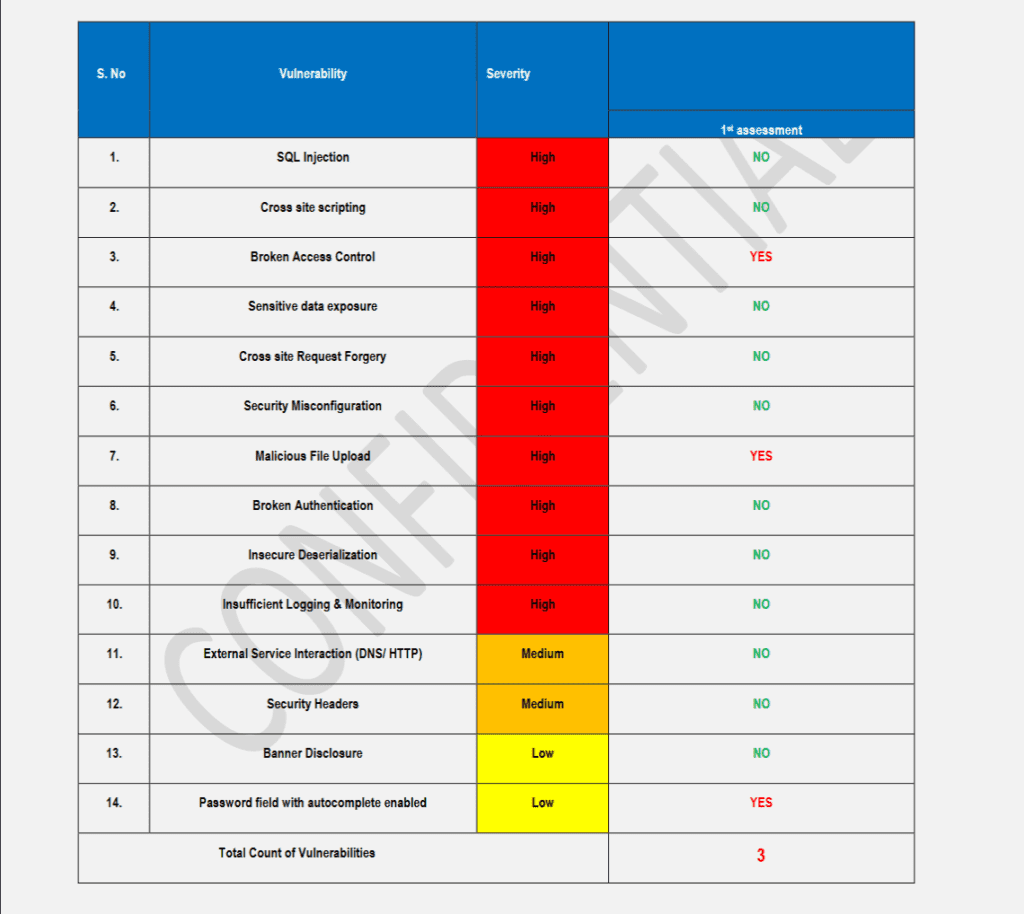Introduction: As enterprises increasingly rely on TypeScript-based ERP systems to streamline operations, ensuring the security of these critical platforms is paramount. This case study delves into Cyber Rely’s comprehensive penetration testing engagement, uncovering critical vulnerabilities including Broken Access Control, Malicious File Upload, and Password Field with Autocomplete Enabled, and providing actionable insights to fortify the client’s ERP security posture.
Client Profile: Our client, a global manufacturing company, operates a sophisticated ERP system built on TypeScript, centralizing key business functions such as inventory management, procurement, and financials. Recognizing the inherent security risks associated with ERP deployments, they engaged Cyber Rely to conduct a thorough penetration testing assessment.
Objectives:
- >>Identify and mitigate vulnerabilities within the client’s TypeScript-based ERP system, focusing on Broken Access Control, Malicious File Upload, and Password Field with Autocomplete Enabled.
- >>Assess the effectiveness of existing security controls and defensive measures implemented within the ERP infrastructure.
- >>Simulate real-world cyber attacks targeting the ERP system to evaluate resilience and response capabilities.
- >>Provide actionable insights and recommendations to bolster the security of the TypeScript-based ERP system and mitigate identified risks.
Methodology: Cyber Rely’s team of penetration testers employed a systematic approach to assess the security posture of the client’s ERP system, encompassing the following phases:
- Reconnaissance and Information Gathering: Cyber Rely conducted thorough reconnaissance to gain insights into the ERP architecture, modules, and potential attack vectors.
- Vulnerability Identification: Leveraging a combination of automated scanning tools and manual techniques, Cyber Rely identified vulnerabilities related to Broken Access Control, Malicious File Upload, and Password Field with Autocomplete Enabled.
- Exploitation and Testing: Through ethical hacking methodologies, Cyber Rely’s penetration testers attempted to exploit identified vulnerabilities, simulating real-world cyber attacks to assess the ERP system’s resilience.
- Reporting and Remediation: Cyber Rely compiled a detailed report outlining the findings, including actionable recommendations for remediation and enhancement of the ERP security posture.
Key Findings:
- Broken Access Control: Vulnerabilities were identified that allowed unauthorized users to access sensitive functionalities and data within the ERP system, posing significant privacy and confidentiality risks.
- Malicious File Upload: The penetration testing revealed weaknesses in file upload functionalities, enabling attackers to upload and execute malicious files, leading to potential system compromise and data breaches.
- Password Field with Autocomplete Enabled: Instances were identified where password fields allowed autocomplete functionality, potentially exposing user credentials to unauthorized access or interception.
Recommendations and Implementation: Armed with the findings from the penetration testing engagement, Cyber Rely collaborated closely with the client to implement targeted remediation measures. Recommendations included:
- Implementing Robust Access Controls: Configuring granular access controls and authentication mechanisms to enforce strict user authorization and prevent unauthorized access to sensitive functionalities and data.
- Securing File Upload Functionality: Implementing file upload validation mechanisms to detect and block malicious file uploads, as well as implementing file type restrictions and server-side scanning for malware detection.
- Disabling Autocomplete for Password Fields: Disabling autocomplete functionality for password fields to prevent the inadvertent exposure of user credentials and enhance password security.
Results and Impact: Through proactive collaboration with Cyber Rely, our client achieved significant improvements in the security posture of their TypeScript-based ERP system. Key outcomes included:
- Mitigation of Critical Vulnerabilities: Prompt remediation actions were undertaken to address identified vulnerabilities, reducing the risk of unauthorized access, data breaches, and system compromise.
- Strengthened ERP Security Controls: The implementation of recommended security measures, including robust access controls, file upload validation, and password field hardening, bolstered the resilience of the client’s ERP system against cyber threats.
- Enhanced Operational Resilience: By prioritizing ERP security and safeguarding sensitive data, our client demonstrated their commitment to protecting business-critical assets and maintaining operational integrity.
Conclusion: In an era marked by escalating cyber threats, securing TypeScript-based ERP systems is paramount to safeguarding business-critical operations and preserving data integrity. Through strategic collaboration with Cyber Rely, our client successfully addressed critical vulnerabilities in their ERP infrastructure, exemplifying the transformative impact of penetration testing and proactive security measures in fortifying digital backbones against evolving cyber threats.
For a deeper understanding of how to prevent security misconfigurations in TypeScript-based applications, be sure to check out our detailed guide on preventing security misconfiguration in TypeScript.
